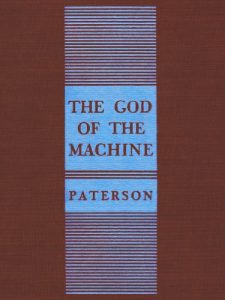"Having read Isabel Patterson [sic], I was not only influenced but convinced that a philosophy that embraced personal liberty, private property, and sound money was the only political philosophy worth championing." -- Ron Paul in "End The Fed"
The God of the Machine "does for capitalism what Das Kapital does for the Reds and what the Bible did for Christianity." -- Ayn Rand
In "The God of the Machine," Isabel Paterson makes a comprehensive case arguing in favor of individual rights, free trade, and free markets. Considered a foundational work on the subject of individualism and libertarianism, it is said to have influenced Ayn Rand, Russel Kirk, William F. Buckley, and Ron Paul.
Original Print Length: 292 pages.
Contents:
Acknowledgement
I The Energy Circuit in the Classical World
II The Power of Ideas
III Rome Discovers Political Structure
IV Rome as an Exhibit of the Nature of Government
V The Society of Status and the Society of Contract
VI Liberty, Christianity, and the New World
VII The Noble Savage
VIII The Fallacy of Anarchism
IX The Function of Government
X The Economics of the Free Society
XI The Meaning of Magna Carta
XII The Structure of the United States
XIII Slavery, the Fault in the Structure
XIV The Virgin and the Dynamo
XV The Fatal Amendments
XVI The Corporations and Status Law
XVII The Fiction of Public Ownership
XVIII Why Real Money Is Indispensable
XIX Credit and Depressions
XX The Humanitarian with the Guillotine
XXI Our Japanized Educational System
XXII The Energy Circuit in Wartime
XXIII The Dynamic Economy of the Future
The God of the Machine "does for capitalism what Das Kapital does for the Reds and what the Bible did for Christianity." -- Ayn Rand
In "The God of the Machine," Isabel Paterson makes a comprehensive case arguing in favor of individual rights, free trade, and free markets. Considered a foundational work on the subject of individualism and libertarianism, it is said to have influenced Ayn Rand, Russel Kirk, William F. Buckley, and Ron Paul.
Original Print Length: 292 pages.
Contents:
Acknowledgement
I The Energy Circuit in the Classical World
II The Power of Ideas
III Rome Discovers Political Structure
IV Rome as an Exhibit of the Nature of Government
V The Society of Status and the Society of Contract
VI Liberty, Christianity, and the New World
VII The Noble Savage
VIII The Fallacy of Anarchism
IX The Function of Government
X The Economics of the Free Society
XI The Meaning of Magna Carta
XII The Structure of the United States
XIII Slavery, the Fault in the Structure
XIV The Virgin and the Dynamo
XV The Fatal Amendments
XVI The Corporations and Status Law
XVII The Fiction of Public Ownership
XVIII Why Real Money Is Indispensable
XIX Credit and Depressions
XX The Humanitarian with the Guillotine
XXI Our Japanized Educational System
XXII The Energy Circuit in Wartime
XXIII The Dynamic Economy of the Future












